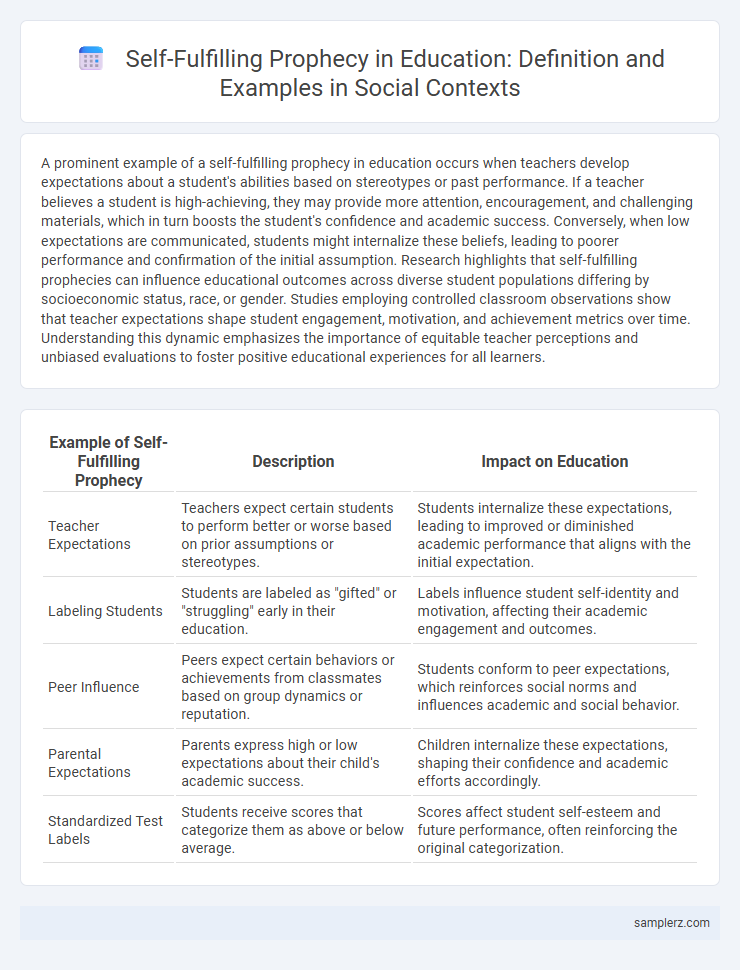A prominent example of a self-fulfilling prophecy in education occurs when teachers develop expectations about a student's abilities based on stereotypes or past performance. If a teacher believes a student is high-achieving, they may provide more attention, encouragement, and challenging materials, which in turn boosts the student's confidence and academic success. Conversely, when low expectations are communicated, students might internalize these beliefs, leading to poorer performance and confirmation of the initial assumption. Research highlights that self-fulfilling prophecies can influence educational outcomes across diverse student populations differing by socioeconomic status, race, or gender. Studies employing controlled classroom observations show that teacher expectations shape student engagement, motivation, and achievement metrics over time. Understanding this dynamic emphasizes the importance of equitable teacher perceptions and unbiased evaluations to foster positive educational experiences for all learners.
Table of Comparison
| Example of Self-Fulfilling Prophecy | Description | Impact on Education |
|---|---|---|
| Teacher Expectations | Teachers expect certain students to perform better or worse based on prior assumptions or stereotypes. | Students internalize these expectations, leading to improved or diminished academic performance that aligns with the initial expectation. |
| Labeling Students | Students are labeled as "gifted" or "struggling" early in their education. | Labels influence student self-identity and motivation, affecting their academic engagement and outcomes. |
| Peer Influence | Peers expect certain behaviors or achievements from classmates based on group dynamics or reputation. | Students conform to peer expectations, which reinforces social norms and influences academic and social behavior. |
| Parental Expectations | Parents express high or low expectations about their child's academic success. | Children internalize these expectations, shaping their confidence and academic efforts accordingly. |
| Standardized Test Labels | Students receive scores that categorize them as above or below average. | Scores affect student self-esteem and future performance, often reinforcing the original categorization. |
How Teacher Expectations Shape Student Performance
Teacher expectations significantly influence student performance by shaping classroom interactions and student self-perception. Studies reveal that when educators hold high expectations, students often demonstrate improved academic achievement and motivation, a phenomenon known as the Pygmalion effect. Conversely, low expectations can contribute to decreased engagement and lower grades, reinforcing negative performance outcomes.
The Pygmalion Effect: When Belief Becomes Academic Achievement
The Pygmalion Effect in education demonstrates how teachers' high expectations can lead to improved student performance, as beliefs shape academic outcomes. Studies reveal that students labeled as "high achievers" often receive more encouragement, leading to increased motivation and success. This self-fulfilling prophecy highlights the powerful role of mindset and teacher perception in shaping educational achievement.
Labeling Students: A Cycle of Success or Failure
Labeling students as "high achievers" or "underperformers" influences their academic outcomes by shaping teacher expectations and student self-perceptions. Research shows that positive labels can enhance motivation and performance, while negative labels often lead to decreased engagement and lower achievement. This cycle reinforces educational disparities, making early interventions crucial for breaking the pattern of self-fulfilling prophecies in schools.
Classroom Interactions as Catalysts for Self-Fulfillment
Teachers' expectations in classroom interactions often shape students' academic performance, reinforcing a self-fulfilling prophecy where positive expectations lead to improved outcomes. When educators provide encouragement and constructive feedback, students internalize these beliefs and increase their motivation and engagement. This dynamic highlights how social cues in educational environments can powerfully influence student achievement.
Stereotype Threat and Academic Outcomes
Stereotype threat in education causes students from marginalized groups to underperform when they fear confirming negative stereotypes about their abilities. This psychological pressure can lower academic outcomes by increasing anxiety and reducing working memory capacity during tests. Research shows that interventions reducing stereotype threat significantly improve grades and standardized test scores among affected students.
The Role of Peer Expectations in Shaping Student Behavior
Peer expectations significantly influence student behavior by reinforcing academic performance and social conduct. When students believe their peers expect high achievement, they often increase their efforts to meet these standards, creating a self-fulfilling prophecy that enhances motivation and success. Conversely, negative peer expectations can lead to decreased engagement and lower academic outcomes, highlighting the powerful role of social context in education.
Feedback Loops: Reinforcing Academic Self-Perceptions
In education, feedback loops significantly reinforce academic self-perceptions, where students who receive positive feedback develop higher self-efficacy and consequently perform better, creating a self-fulfilling prophecy. Conversely, negative feedback can diminish confidence, leading to lower academic engagement and achievement, which perpetuates the initial low expectations. This cyclical interaction between teacher feedback and student self-perception strongly influences educational outcomes and motivation.
Parental Involvement and Self-Fulfilling Academic Prophecies
Parental involvement significantly impacts self-fulfilling academic prophecies, as students internalize parents' expectations and beliefs about their abilities, which can influence their academic performance. When parents convey high expectations and actively support learning, children often meet or exceed those expectations, reinforcing positive academic outcomes. Conversely, low parental expectations may lead to diminished student motivation and achievement, perpetuating a negative cycle in educational settings.
The Impact of Early Tracking and Grouping in Schools
Early tracking and ability grouping in schools often reinforce social inequalities by shaping students' academic self-concepts and future opportunities. Students placed in lower tracks tend to internalize expectations of underachievement, which can limit motivation and performance, creating a self-fulfilling prophecy. Research shows that these practices disproportionately affect marginalized groups, perpetuating educational disparities and hindering social mobility.
Overcoming Negative Self-Fulfilling Prophecies in Education
Overcoming negative self-fulfilling prophecies in education involves implementing growth mindset interventions that encourage students to view abilities as developable through effort. Teachers who provide consistent positive feedback and set high expectations foster resilience and academic improvement, breaking cycles of low performance. Evidence from educational psychology shows that tailored support programs and inclusive classroom environments significantly reduce the impact of limiting beliefs on student achievement.

example of self-fulfilling prophecy in education Infographic
 samplerz.com
samplerz.com